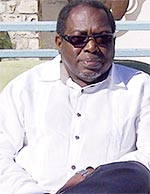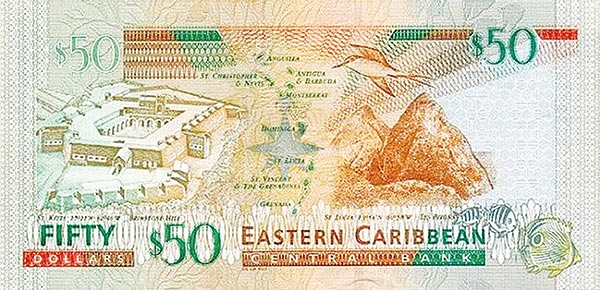
SINCE his sudden and unexpected passing away on December 22 at the age of 70 (he would have been 71 in two weeks’ time), tributes to the former long serving governor of the Eastern Caribbean Central Bank (ECCB), Sir K. Dwight Venner, have poured in from almost all over the world, culminating in the touching and moving testimonies from members of his family and close friends at his official funeral service at the Cathedral of the Immaculate Conception in Castries on Wednesday.
While for his family it was his exemplary role as a husband and father and family man that will remain etched in their hearts, for others like Sir Vaughan Lewis his eulogist, friend and former regional public servant like himself in the OECS network and Prime Minister Ralph Gonsalves of St Vincent and the Grenadines, also a friend and former University colleague, it was his work as the Central Bank Governor and committed regional integrationist that has lifted him to the pantheon of Caribbean heroes.
He was indeed a giant of the Eastern Caribbean regional integration system. As the second governor of the ECCB for 26 years (1989-2015, the longest serving Governor of any central bank or monetary authority) Sir Dwight moulded the institution into one of the finest, if not the finest, Central Bank in the region giving the Eastern Caribbean dollar a strength and stability far beyond the importance and international weight of the mini island states which form the Eastern Caribbean currency union. That the EC dollar and the ECCB were models for the European Union’s central bank and its Euro is adequate proof of what Sir Dwight was able to accomplish for the region.
Under his tenure, the ECCB became one of the bedrocks of the Organisation of Eastern Caribbean States, providing the regional integration movement with the stable, financial foundation and the wise monetary direction that it had required, particularly in years of turbulence that included the collapse of the Windward Islands Banana industry in the late 1990’s and the international financial crisis of 2008 – 2009. K Dwight Venner was also one of the major contributors to and authors of the Revised Treaty of Basseterre which launched the OECS economic union. His monumental contribution to Eastern Caribbean monetary integration and its financial sector have been universally acknowledged by all who have commented on his work.
Swinburne Lestrade, a former Director-General of the OECS and another close friend and colleague of Sir Dwight, had declared in the third part of the OECS TV documentary series, The OECS: The Founders, broadcast just two months ago, that in the early years of the OECS, Sir Dwight, from his position at the ECCB had provided invaluable support to the OECS Secretariat and the integration scheme and that his work was critical in the economic development of the Eastern Caribbean states:
“ I would like to say that we were lucky to have had someone like Dwight Venner there for as long as he was because Dwight was an integrationist as I told you before, from way back; and from where I sat at the Economic Affairs Secretariat and later at the OECS in St. Lucia, there were things we wanted to do but could not because of our resource constraints- financial and staff resources- which we were able to persuade the Central Bank to take on for us; and we were well received at the Bank and that had a lot to do with who was at the Central Bank at the time. In fact the Bank got into some difficulty at times because some of the Heads thought the vision was being expanded too much which I understood; but if the Bank had concentrated mainly on monetary policy, the region as a whole- our OECS region- would not be where it is today. I doubt we would have had an economic union at this stage. I think that Dwight Venner is mainly responsible for that development.”
How should such a man be honoured? It cannot be simply through the tributes that we have been hearing over the last few weeks and which will be forgotten in time. When he died, the ECCB revealed in a statement, that it had planned to honour him by naming one of the buildings at the ECCB after him at a ceremony that was due to take place in eight weeks. Commendable yes, at the time of its conception; with his untimely death now, not enough. When Sir John Compton, St. Lucia’s longest serving Prime Minister, died in 2007, Sir Dwight in delivering his eulogy had declared of Sir John, “Anyway you turn it, this was indeed a great man”. The same applies now to Sir Dwight. He was a great man, anyway you analyse it, and great men deserve great honours.
For me there can be no greater way of honouring Sir Dwight but by placing his image on one of the bank notes of the Eastern Caribbean dollar – the currency he protected and promoted so assiduously. At his funeral service, it was disclosed that Sir Dwight had been the prime mover behind the placing of the image of Sir Arthur Lewis on the EC 100 dollar note. According to the ECCB’s website this was “a deserving symbol of his (Sir Arthur’s) remarkable contribution to regional integration and sovereignty”. Now Sir Dwight’s own colossal contribution to the ECCB and regional integration, his constant exaltation for and vision of the political union of these Windward and Leeward Islands, his sterling defence of their sovereignty in the face of harsh pressures from international financial institutions like the International Monetary Fund (IMF) and the World Bank, deserve no less.
I recommend that Sir Dwight’s image be placed on the back of the EC $50 note instead of the picture of the Saint Lucia Pitons which now graces it; or consideration can be given to introducing a new note with his image- a two dollar note perhaps; or replacing the image of the ship with that of Sir Dwight on the one dollar coin – a coin which everyone uses and which will therefore ensure the widest circulation of this homage to him. Whatever bank note or coin on which his image appears, it will be an everlasting tribute to his work, his legacy and his memory.
At the end of his eulogy for St John Compton, K Dwight Venner had summed the case for Sir John’s greatness thus: “ If he was so clearly loved and cherished by his family; if he was so loved and esteemed by his friends;…..If the political establishments, leaders of the region and people of the Caribbean have been so fulsome in their praise and affection for him; if the international community has noted his passing with sadness and expresses its highest regard for his contribution, Then I can only contend that the matter has been definitively concluded”.
These words are just as apt an argument for Sir Dwight’s greatness as they were for Sir John’s and so I say, the matter of his image on an EC dollar note is definitively concluded.














1 Comment